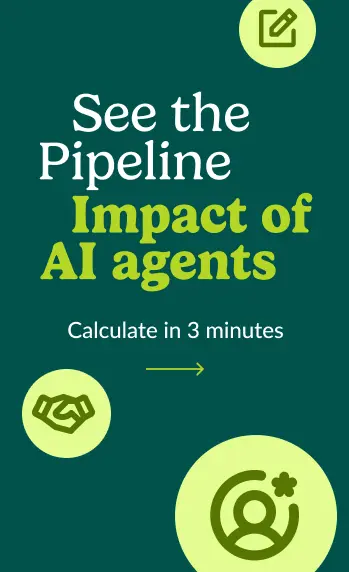The State of AI Agent Readiness in Sales
Published:

Where revenue leaders stand on AI agent adoption — and how to move faster.
Why we studied this
Revenue leaders feel pressure to lead the charge into AI. The message is omnipresent: AI agents will transform sales. And yet, when it comes to AI adoption, most leaders run up against the same questions:
- What exactly is an AI agent?
- Who in the organization is responsible for driving this change?
- How do we prove the value of AI agents without putting deals (and trust) at risk?
The gap between expectation and readiness is real and growing. This report is designed to help you close that gap with insights you can act on right away.
We studied where teams are gaining ground, where they are stalling, and what leaders can do to get ready for agentic AI.
Methodology
- Participants: 51 revenue leaders
- Industries: SaaS/technology, financial services, media, healthcare, and manufacturing
- Company Size: Mid-market, Enterprise
Executive Briefing
Agentic AI is the new proving ground for sales leadership
Leaders agree AI will transform sales, but they haven’t defined how
While 96% of surveyed leaders believe AI will transform their sales organization in the next 1–2 years, they don’t share an understanding of what that looks like. Nearly all respondents (98%) know AI agents can automate tasks, but far fewer (16%) are aware that AI agents also offer insight and decision support.
Ownership is unclear, and that lack of clarity is slowing adoption
When asked what department is responsible for AI sales initiatives, responses varied, and no clear leader emerged. Responsibility tends to be spread across 2–4 roles, most commonly Revenue and Sales Operations leaders (76%), Sales leaders (69%), or technical leaders such as the CIO, CTO, or CISO (51%). At 47% of companies, the CEO is involved in the process.
The value proposition lands, but trust is still a barrier
While most sales leaders (86%) are at least experimenting with AI tools and agents, and one-third have deployed AI across multiple teams, many still report challenges to adoption. The most common concerns are losing the human touch (53%), AI decision accuracy (51%), and data privacy and security (47%).
Saving time and advancing deals are the most desired outcomes
Sales leaders are most interested in how AI can accelerate revenue. The most popular metrics for evaluating the impact of AI tools include efficiency and productivity (86%), faster sales cycles (75%), and increased lead/sales funnel conversion and win rates (73%).
Skills, not skepticism, are the biggest barrier to effective AI adoption
With only 6% of sales leaders able to say their teams are well-equipped to use sales AI effectively, skills gaps are a clear barrier to adoption. The good news is that only 24% say their teams are skeptical of AI.
The 5 big takeaways
Takeaway 1: Leaders will agree AI will transform sales, but they haven't defined how
"An AI agent should be able to perform autonomous tasks, make decisions, and learn over time — just like humans. A super agent should be able to perform the tasks of orchestration as well — just like a manager would.”
- Amulya, Senior Director of Revenue Operations
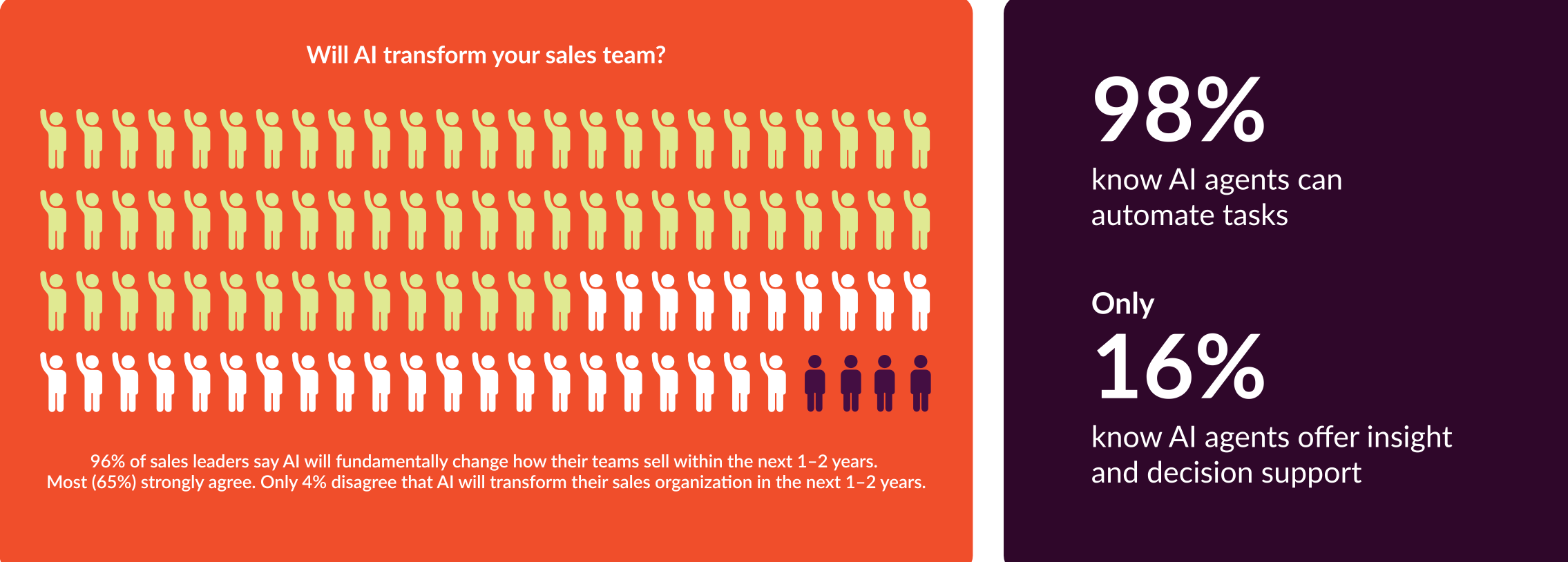
What this means:
While almost all sales leaders agree that AI will fundamentally transform sales, a critical gap emerges in their understanding of a key AI technology: agentic AI. Definitions of what an AI agent for sales is and does vary widely, with 98% mentioning automation of manual tasks but only 16% mentioning insight or decision support beyond routine automation. To build an effective AI strategy for your revenue organization, revenue, tech, and operational leaders must share an understanding of what AI agents are and what they are capable of doing.
Don’t get lost implementing AI for AI’s sake. Before investing in tools or rollout plans, focus on education and alignment to ensure clarity on what AI agents are, what they can do, and how they will help your team achieve revenue goals more efficiently and effectively.
Looking for a clear definition of agentic AI? Find it in our guide: AI Agents at Your Service: A Practical Guide for Sales Leaders
Takeaway 2: Ownership is unclear, and the lack of clarity is slowing adoption.
"The goal is to have sellers in front of customers and take away as much manual, low-value work as possible.”
– Lauren, Head of Revenue Operations
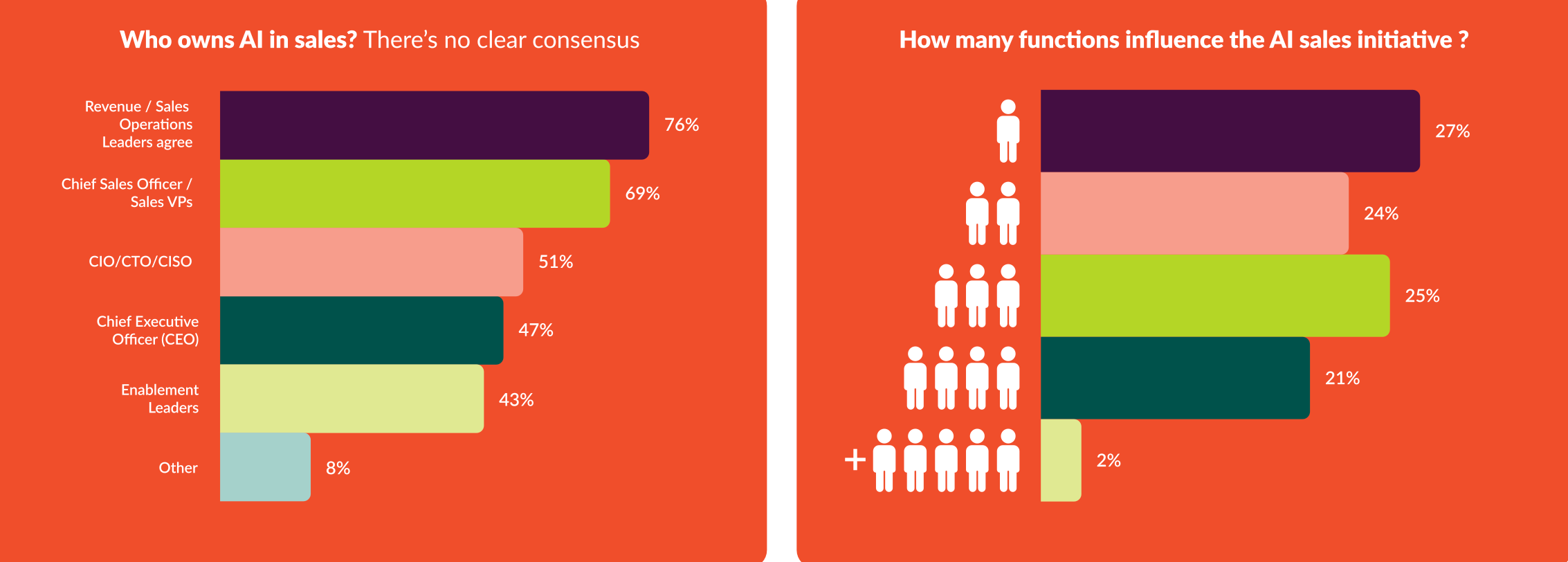
What this means:
Revenue Operations (RevOps), senior sales leaders, and the CIO (or CTO or CISO) all have a stake in sales AI ownership, and survey data reflects this, with ownership of AI initiatives more scattered than structured. Most companies have two to four roles working on their sales AI adoption effort, but those roles vary widely, and nearly half (47%) involve the CEO.
The structure is still emerging, but a cross-functional group is the norm. Proper planning and coordination will be essential for creating the clarity on ownership and alignment needed across departments to implement sales AI agents successfully.
For a successful AI sales initiative, don’t go it alone — make sure your top levels of leadership and key stakeholders are involved and aligned. Consider including
- CIO to own business-level AI transformation
- CRO to work with CIO on revenue team strategy and transformation
- RevOps as the revenue tech stack owner and process administraton
- An AI Council that aligns goals, definitions, KPIs, and more across the organization
This foundation will allow you to roll out AI agents quickly and effectively across the revenue organization.
Takeaway 3: The value proposition lands, but trust is still a barrier
"I am still concerned about how effective AI agents will be… customers want a human touch."
– Sean, Director of Inside Sales Enablement
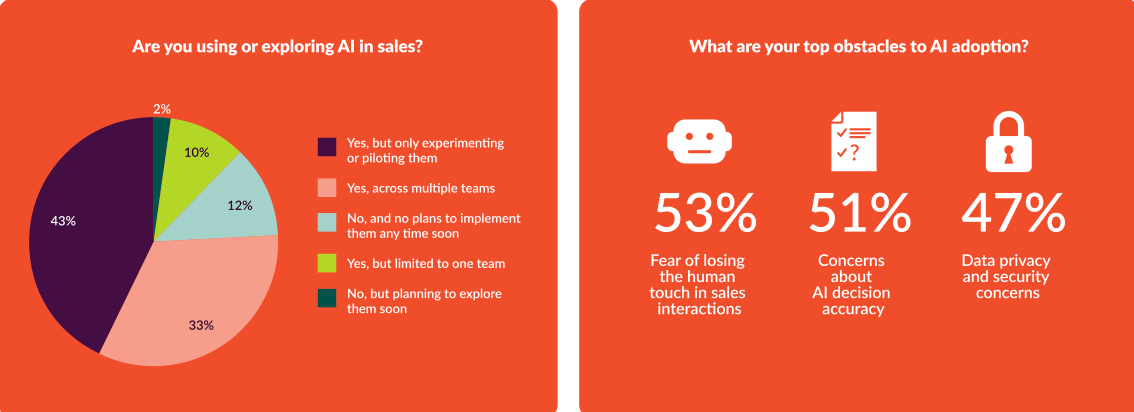
What this means:
Sales leaders believe in the promise of AI sales tools, especially for automating busy work and freeing up sellers for high-value conversations.
43% of leaders report that they’ve implemented AI tools or agents already (33% across multiple teams; 43% experimenting/piloting AI).
But trust issues remain. Just over half of sales leaders worry that AI will rob sales of the human touch (53%) or make reliable decisions (51%). Almost as many are concerned about data security (47%).
Until sales leaders address concerns about the accuracy and security of AI technology, adoption will remain cautious and uneven.
Make transparency and explainability part of the agent experience, not just an afterthought. Leaders must prioritize AI agents that integrate securely across the tech stack, then clearly show users where they get their data from (i.e., transparency) and how AI agents arrive at decisions (i.e., explainability).
Learn how Salesloft embeds explainability and context into AI recommendations and actions: AI at Salesloft
Takeaway 4: Saving time and advancing deals are the most desired outcomes
"Top inefficiencies are slow responses to incoming leads, where we lose momentum. AI agents could really help here in answering those questions more quickly and passing them on to the right rep.”
– Marlen, Regional Sales Director
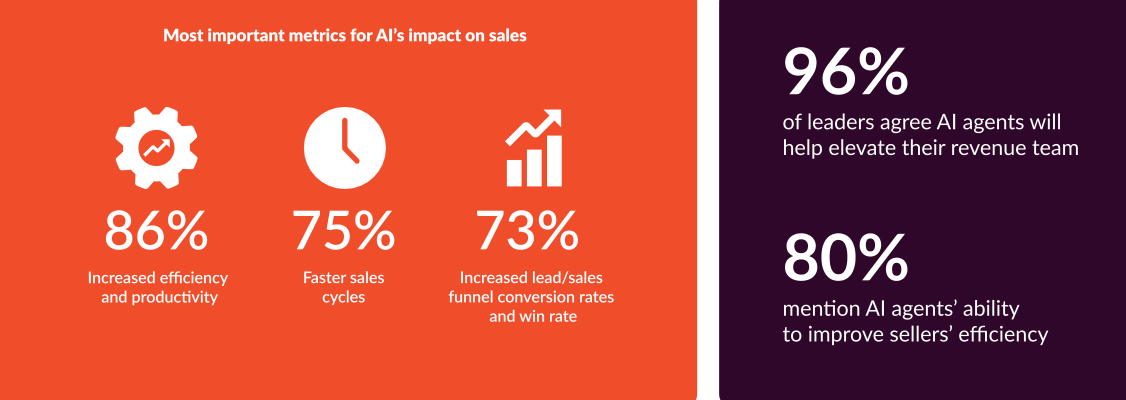
What this means:
When evaluating AI’s impact, sales leaders most want to see revenue acceleration. They prioritize increased efficiency and productivity (86%), faster sales cycles (75%) and increased conversion and win rate (73%).
96% of revenue leaders believe agentic AI will elevate their revenue team, and 80% mention improvements in efficiency, such as offloading manual tasks. Agentic AI delivers value across the sales process with more than automation. AI agents can accelerate the pipeline from lead qualification and prioritization to spotting seller coaching opportunities.
Agentic AI’s real power lies in its ability to enhance focus, timing, and frictionless motion throughout the revenue cycle.
Anchor your AI agent strategy to immediate, tangible wins. Think about where AI can add most value along the spectrum of efficiency and growth, and explore use cases for each.
See the top value cases for AI agents in our guide: AI Agents at Your Service: A Practical Guide for Sales Leaders
Takeaway 5: Skills, not skepticism, are the biggest barrier to effective adoption
"We started by leveraging sales cadences to manage the workflow, and AI agents are a logical next step to take on more of the burden.”
– Frank, Global Head Of Sales Operations Enablement
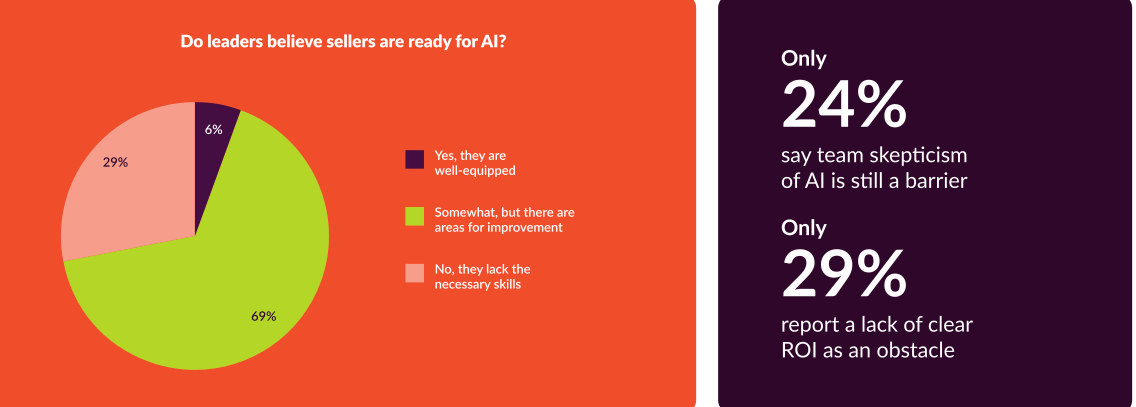
What this means:
Most sales leaders recognize the upside of AI in sales, understand the benefits it can deliver, and believe it can deliver ROI with it. But for the most part, they don’t feel their teams are ready.
29% of leaders say their sales teams lack the skills they need to use AI effectively. 69% say their sellers are “somewhat” ready. Just 6% believe their sales team already has the skills required to use sales AI effectively.
The way organizations launch, enable, and scale solutions will be key to their success with agentic AI. AI agents with explainability built in are designed for revenue-specific workflows to provide fast time to value without requiring additional technical skills.
Change management is critical to launching or scaling any technological transformation. First, choose a purpose-built revenue platform with explainability built in so it’s ready to provide time to value on Day 1. Then, define a thoughtful process to launch enablement trainings, measure adoption, and prove outcomes.
Learn more in our guide: How CROs Use Sales Enablement for Repeatable Wins
Where sales leaders go from here
AI agents are shaping how sales organizations operate, and early movers still have an opportunity to get ahead of the competition.
Prioritize use cases based on business objectives and prove value across efficiency to growth outcomes.
Build AI agents into your enablement strategy from explainable recommendations that upskill your reps as they work to coaching agents that help identify and address skill gaps.
If you’re feeling the pressure to move faster but aren’t sure where to start, you’re not alone. The key isn’t overhauling your entire sales motion overnight. It’s starting small, building trust, and proving value early.
Here’s where to focus next:
- Define what AI agents mean for your organization to create a shared language before you invest.
- Co-own AI revenue strategy with IT and RevOps because alignment equals velocity.
- Embed AI into the existing workflow to maximize value for your sellers and minimize disruption.
- Prioritize use cases based on business objectives and prove value across efficiency to growth outcomes.
- Build AI agents into your enablement strategy from explainable recommendations that up-skill your reps as they work to coaching agents that help identify and address skill gaps.
AI agents are becoming a core part of how revenue teams win.
Leaders who align early, act deliberately, and stay focused on tangible outcomes will pull ahead.
Where to start? Take our Interactive AI Maturity Assessment to identify where to focus your AI efforts to drive the greatest impact.
